2 min read
Gospel-Centered from the Start
“Let us hold unswervingly to the hope we profess, for He Who promised is faithful…Jesus Christ is the same yesterday, today, and forever.” (Hebrews...
5 min read
 Barbara Comito, former marketing director
:
July 10, 2019
Barbara Comito, former marketing director
:
July 10, 2019
In her article “Does Poverty Cause Homelessness?” Marchauna Rodgers argued that the United States has misdiagnosed the problem of homelessness, equating it with a lack of resources, or specifically one resource – a home. As a result of that misdiagnosis, she wrote, government programs and social services have focused on addressing symptoms rather than root causes.
It’s easy to see how we went astray. It’s right there in the word: home-less-ness. If someone is home-less, it would seem we could rectify that situation by providing the thing s/he is lacking.
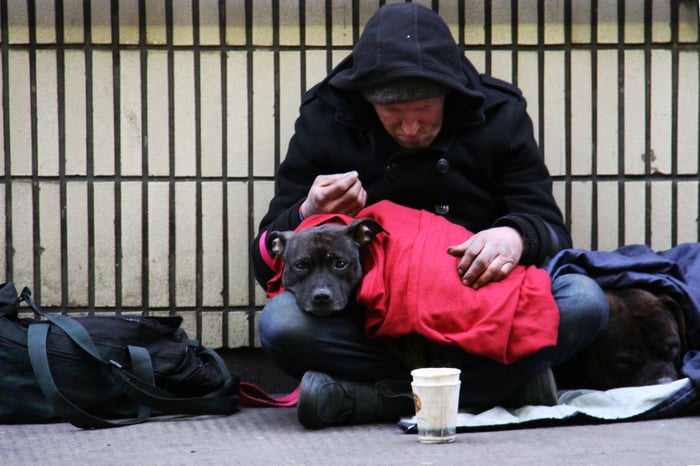 But what if that person is also friend-less, job-less, without a family or the social and life skills one is supposed to learn in a family? What if that person is severely depressed, suffering from trauma, domestic violence or severe anxiety? What if that person aged out of the foster care system and doesn’t really know how to do life on her own? What if that person can’t read or dropped out of high school? What if she keeps getting fired because of angry outbursts that have nothing to do with her job? What if he is coping in the only way he knows how – self-medicating with drugs and alcohol? What if that person is not only home-less but hope-less?
But what if that person is also friend-less, job-less, without a family or the social and life skills one is supposed to learn in a family? What if that person is severely depressed, suffering from trauma, domestic violence or severe anxiety? What if that person aged out of the foster care system and doesn’t really know how to do life on her own? What if that person can’t read or dropped out of high school? What if she keeps getting fired because of angry outbursts that have nothing to do with her job? What if he is coping in the only way he knows how – self-medicating with drugs and alcohol? What if that person is not only home-less but hope-less?
A home in and of itself doesn’t seem to address any of those deeper issues.
Pastor John Repsold intentionally started a church in downtown Spokane because he wanted to work with people in poverty, people struggling on the verge of homelessness. And he wanted to get to the deeper issues. “If you don’t address the issues that made people homeless in the first place, simply putting them behind a door doesn’t make their life that much better…What we need to do as a community is to begin to develop long-term solutions that help people actually better their lives and address the issues that often led them into homelessness.”
Mosaic Fellowship, at 606 W Third Ave., is trying to do just that. “One of our burdens here is to help people actually address the issues…perhaps of addiction, perhaps of abuse, perhaps of personal brokenness that leads often to homelessness in a way that we can then help them get back to an employable sector in life, get back into relationships with people. Much of the problem is relational. It is not financial.”
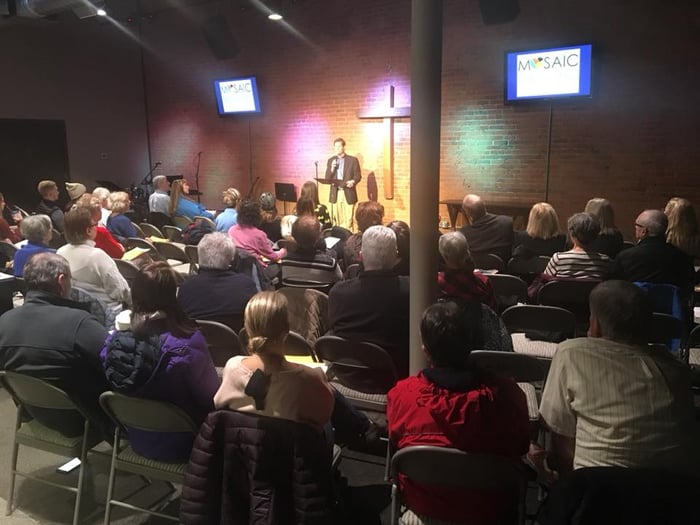
You have probably heard it stated that we are all one paycheck, one severe illness, one job loss away from homelessness. But are we?
A couple years ago, my husband lost his job of 16 years. It was unexpected. He was at the high end of his career track. There weren’t many other comparable jobs in our area, and I made less than half of what he did. He had trouble finding a new job. It took months, which eventually turned into years. We lived off savings until our savings ran out. We were down to the wire.
It was scary and awful, but honestly, I never once worried that we would be on the streets.
We had family, friends that were like family, and a church family. We might have lost our home. Our children might have had to drop out of college. We might have had to move in with someone else for a while. But we had a safety net. We had savings, and we had a support network of people who weren’t going to let us end up homeless.
The single biggest difference I see between the majority of people coming through the doors of UGM and my circle of friends outside of UGM is this: Most of the people with whom I associate outside of UGM have a support system – a group who will catch them if they start to fall. Most of the people who come to UGM do not. When they fall, they fall hard, and no one is there to catch them.
(Please note: there are certainly exceptions to this. Sometimes it is a person's family or support system that refers them to UGM because they know this is the place where they can get the help they really need.)
Sometimes, people experiencing homelessness don’t have a support system because their family of origin was dysfunctional from the get-go. Sometimes, people experiencing homelessness have burned all their bridges through drug use and lying and stealing. Often, it is a combination of the two.
Dr. John Wolfe, a neuropsychologist working with the Department of Corrections, explains that almost all destructive life choices have a history behind them. “I have hours where I sit down and talk with these individuals, and my experience has been, when they were four or five years old, their life goal was not to be a criminal; their life goal was not to be a meth addict. They, in some ways, are surprised to find themselves where they are.
“Nobody wakes up one morning and says, ‘I’m just going to go ruin my life and take cocaine and methamphetamine’ … And so if you back up, what you will often find is there are early life events, early traumas in some cases. Sometimes it’s a biological trauma, there’s been a brain injury. Sometimes it’s a psychological trauma; there’s issues of abandonment, abuse or neglect. Combinations of all of these things actually occur.”
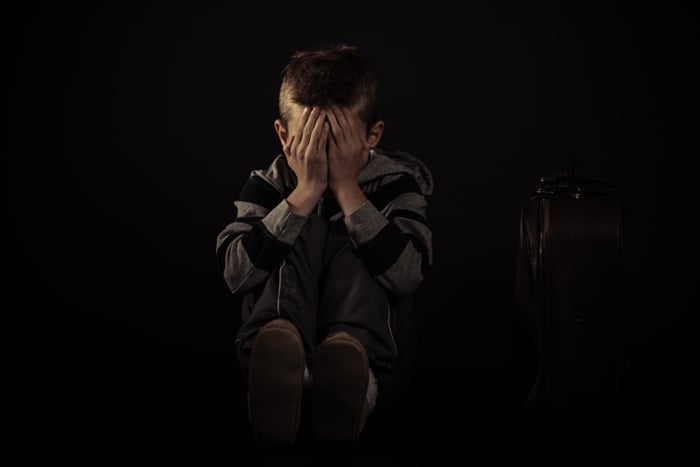
Adverse Childhood Experiences, a term used to describe childhood abuse, neglect and other traumatic experiences, have been linked to chronic health conditions, self-destructive behaviors and even early death. High ACEs scores are common among UGM residents.
Dr. Mark Baird, clinical psychologist and assistant professor at Whitworth University, says someone who has experienced five ACEs is seven to ten times more likely to use illegal drugs. “It makes sense! Childhood trauma teaches kids early on that life is dangerous. The very homes that are supposed to be havens of happiness and support, instead are war zones. Their internal alarm is constantly getting tripped, knocking their Cerebral Cortex off-line, inducing extreme feelings of terror, but leaving few resources to deal with those overwhelming feelings…Drugs and alcohol quiet that alarm and numb that terror.”
Of course, drugs and alcohol create their own problems. “Once people have engaged in using substances,” Dr. Wolfe explains, “it changes your brain. Many of these substances will alter the chemical messengers, the neurotransmitters that are in the brain. And any type of treatment program needs to allow for a reprogramming, so to speak, of how these messengers talk with brain cells.”
Properly diagnosed, homelessness is not just one problem; it’s a whole host of problems that overlap and influence each other. And the solution to homelessness is not as simple as providing housing. Affordable housing is a factor, and UGM supports more affordable housing, but we want to see that housing coupled with other resources – case management, counseling, job training.
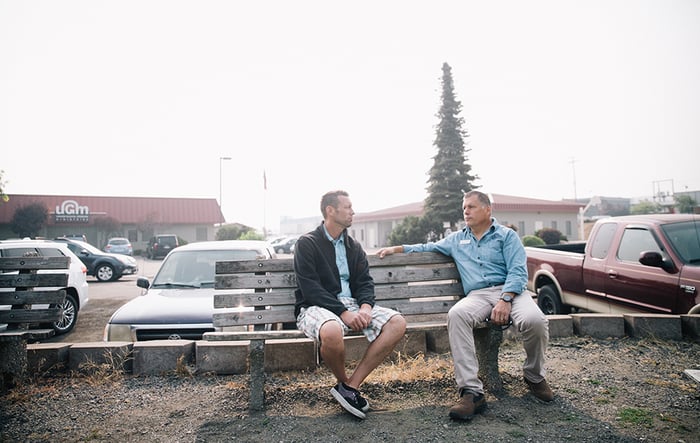
Dr. Wolfe explained that healing for trauma happens best in community over time. “The community functioning correctly is a reconciliation community…Yes, the platform starts with housing and shelter, but then at some point, you need a larger life goal. I need a larger vision for where I am going. How do I fit in? How do I find meaning? How do I find direction? And, that again, once that sort of safe, secure environment is in place is where you can begin to explore that.
“I don’t think you just wake up one morning and it’s all worked out: ‘I’ve got my life planned out.’ It doesn’t just happen. You need time. You need a community. You need people that can help guide you, professionals in some cases. How do I begin to move forward and begin to put these pieces back in place?”
That holistic approach to recovery is what UGM seeks to provide and what we believe is necessary to end homelessness – one person at a time.
Addiction isn't just about abusing substances. Watch former UGM Counselor John Dunne explain how trauma often underlies the pathway to addiction and homelessness.

2 min read
“Let us hold unswervingly to the hope we profess, for He Who promised is faithful…Jesus Christ is the same yesterday, today, and forever.” (Hebrews...

9 min read
To celebrate 75 years of serving the Inland Northwest, we are spending the year remembering our history and the faithfulness that built us and...

2 min read
In 2026, Union Gospel Mission Inland Northwest is approaching our 75th Anniversary! This is a milestone that invites gratitude and reflection, and...

Has America misdiagnosed the problem of homelessness? In her article “Does Poverty Cause Homelessness?” Marchauna Rodgers argues that we have. She...
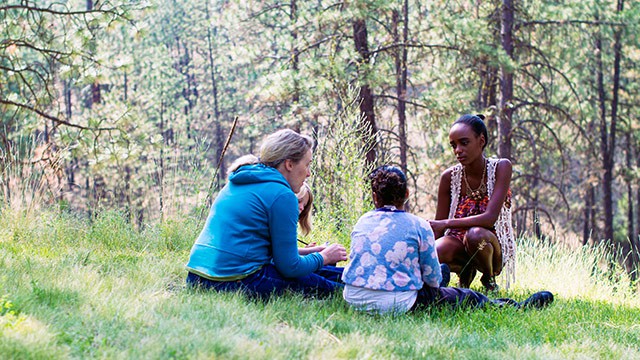
As a young kid, Zola lived with her mom, homeless in Compton, surrounded by an environment of drugs and prostitution. “I remember one time, because...
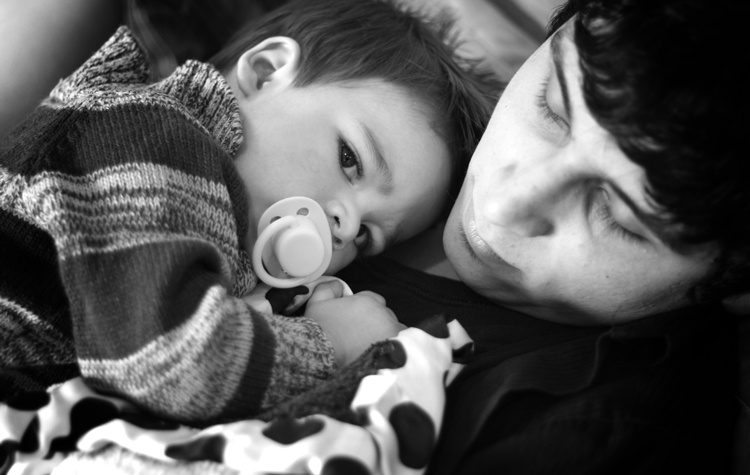
1 min read
All of God’s ways are perfect. One of His ways for life on planet Earth was to create the family unit. As we see in the Scriptures, the original...